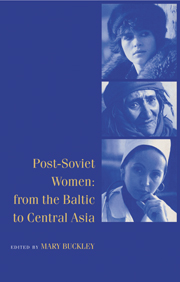Book contents
- Frontmatter
- Contents
- List of figures
- List of tables
- Notes on contributors
- Note on transliteration
- Map
- INTRODUCTION
- PART I WOMEN IN THE RUSSIAN FEDERATION
- PART II WOMEN OUTSIDE RUSSIA IN NEWLY INDEPENDENT STATES
- 11 Women in changing societies: Latvia and Lithuania
- 12 Progress on hold: the conservative faces of women in Ukraine
- 13 Out of the kitchen into the crossfire: women in independent Armenia
- 14 The women's peace train in Georgia
- 15 Between tradition and modernity: the dilemma facing contemporary Central Asian women
- Index
11 - Women in changing societies: Latvia and Lithuania
Published online by Cambridge University Press: 18 December 2009
- Frontmatter
- Contents
- List of figures
- List of tables
- Notes on contributors
- Note on transliteration
- Map
- INTRODUCTION
- PART I WOMEN IN THE RUSSIAN FEDERATION
- PART II WOMEN OUTSIDE RUSSIA IN NEWLY INDEPENDENT STATES
- 11 Women in changing societies: Latvia and Lithuania
- 12 Progress on hold: the conservative faces of women in Ukraine
- 13 Out of the kitchen into the crossfire: women in independent Armenia
- 14 The women's peace train in Georgia
- 15 Between tradition and modernity: the dilemma facing contemporary Central Asian women
- Index
Summary
The process of national awakening which had begun in the Baltic republics of the Soviet Union in earnest in 1988 led to declarations of independence in 1990 in Lithuania and in 1991 in Latvia. Following these there began the so-called ‘period of transition’, a transition from Soviet political and economic structures and way of life to full democracy and market-based economic relations. General changes affecting the populations at that time also had a profound effect on women.
The situation of women in Latvia and Lithuania is well documented. There are many women academics who have been doing research in women's issues, and there is much activity in women's organisations which have been set up since independence. Large numbers of women journalists have been promoting awareness of the problems women face. In a relatively short time they have together amassed a considerable body of information on the situation of women in their respective countries. The present essay draws on some of this material.
Before going on to examine various aspects of the situation of women since independence, it is useful to note that although Latvia and Lithuania are relatively more detached from the other former republics (they have not joined the CIS) and more Western-oriented (as they were while still part of the USSR), the commonality of their Soviet experience has ensured that changes which have been taking place there are, in the main, very similar to what is happening in Russia and some other parts of the former Soviet Union.
- Type
- Chapter
- Information
- Post-Soviet WomenFrom the Baltic to Central Asia, pp. 203 - 218Publisher: Cambridge University PressPrint publication year: 1997
- 2
- Cited by



